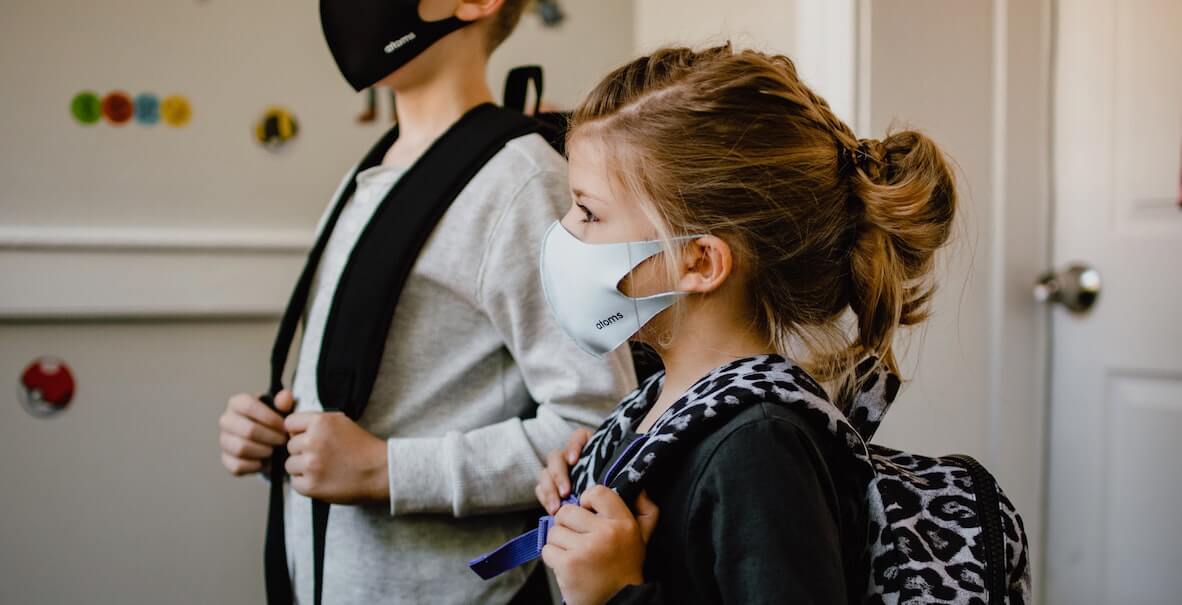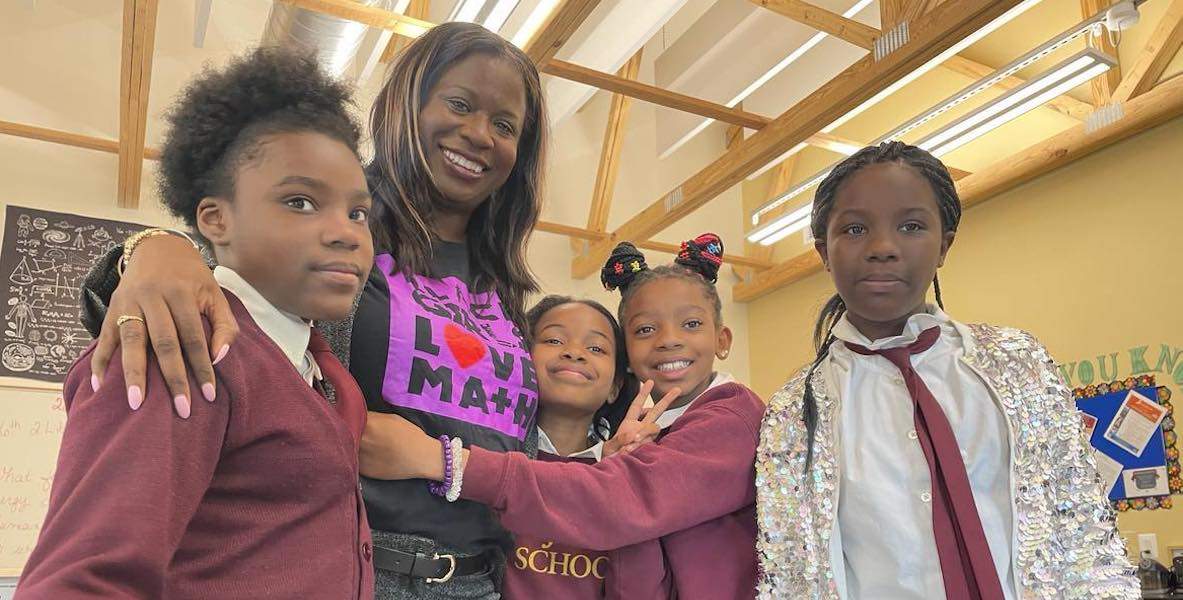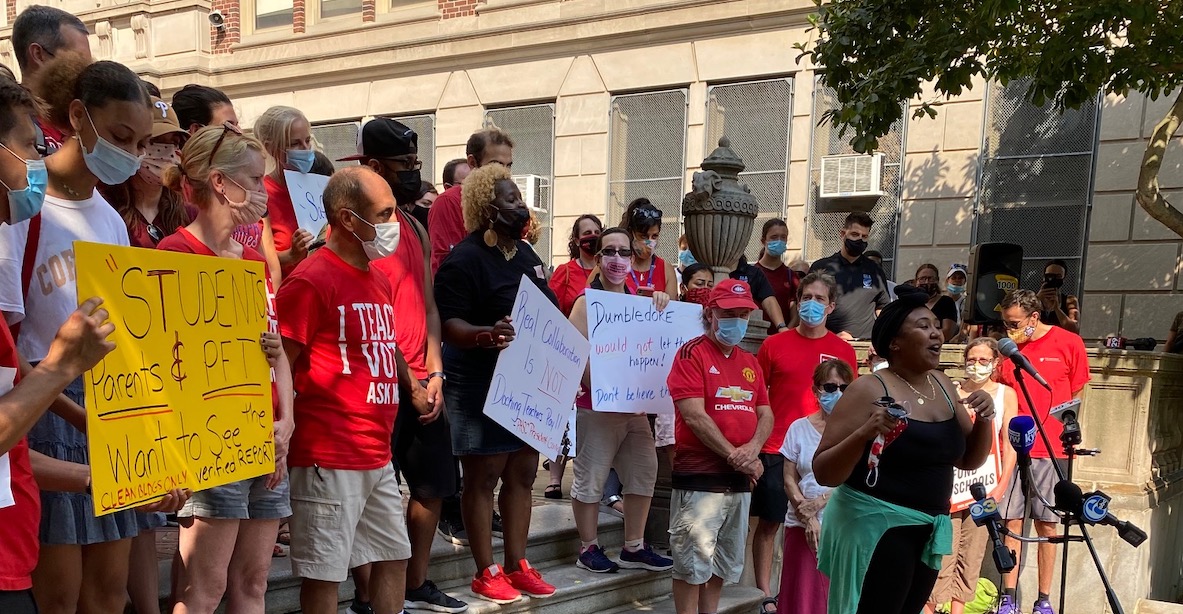It was somewhere in the midst of the second (or was it third?) protest/press conference on the steps of Julia R. Masterman High School that I lost it.
This was the day before school was set to start in August—a day every single student, parent and teacher in Philadelphia has been anxiously awaiting for 18 long, awful months. A day before the School District of Philadelphia would welcome 120,000 city children, and start the slow, hopefully steady road towards healing from the emotional, physical and academic loss of the pandemic.
The issue at hand at Masterman—as it has been in District facilities for years—was the state of the school building. Namely: the potential existence of hazardous asbestos in classrooms and other spaces used by students and teachers. The week before, teachers had taken their prep outside to the school’s courtyard, to make a point about their worries over safety inside. The District responded by threatening to cut their pay if they didn’t return inside. (They didn’t.) Several parents came out to support the teachers, including Councilmember Helen Gym, who took to the mic to blast the District.
This was followed by several letters from the District to parents, claiming all the hazards had been cleared; that they’d sent thousands of pages of requested info to the Home and School Association to that effect; that all was safe for kids and adults to return to school.
It’s hard to imagine anyone in any enterprise thinking it’s okay to greet their customers with overflowing dumpsters. Can you imagine a patron putting up with this level of shoddiness at a restaurant, or a department store, or a cable company? Public school students and families shouldn’t have to either.
The Monday before school started, though, the HSA was back (with Gym) in front of the school. Those pages of info? It took a right-to-know request to get them, chair of the HSA’s environmental committee Barbara Dallao said. Members of her team spent hours over the summer poring through them, trying to get answers. And even then, she said, they are not clear that everything is copacetic. (The District is in the process of launching a software program that will allow for records to live online and be viewed by the public.)
Meanwhile, at almost the same time, teachers across town at Science Leadership Academy-Beeber also walked out of work after they discovered several health hazards at their building—this time prompting a mea culpa from the District and an announcement that SLA-Beeber students would have to start the year…virtually.
Katie Burrows-Stone, an SLA-Beeber teacher, wrote in the Inky on what should have been a great first day of school:
Our building, like many others in this city, should never have been neglected to the point of disrepair in the first place. The construction should have been started and finished much earlier during the 15 months that the building sat vacant since March 2020. The school district should have had the foresight and care to know that porta-potties are not a realistic solution to a shortage of bathrooms. The school district should have taken earlier action in regards to parent and community concerns about our building. And it should have allowed teachers more time to make new plans. The predominantly Black and brown population that my school serves should not be punished for the mismanagement and carelessness of school district leaders. The community should not have to fight for basic safety and equitable learning conditions for all.
As Dallao has pointed out, if Masterman (and by extension SLA)—crown jewels of the District—are experiencing this level of uncertainty, disarray and possible or real health dangers, you can be certain the same is happening at less-resourced schools all over the city.
“So much rage. What is wrong with this city????”
These were by no means the first communication and organizational mishaps that have marked the start to school this year. There was also, because of a school bus driver shortage, the move this summer to standardize start and end times for the District, which previously had 28 different schedules. Those new times led to outrage among families: Most high schools start at 7:30 am this year, going against the scientific research that says adolescents learn better if they start their days later; many elementary schools start at 9 a.m., a childcare hardship for working parents.
There was the worrying—perhaps posturing—news on the first day of school that teachers might go on strike just as students were getting ready to learn. (Somehow between Philadelphia Federation of Teachers President Jerry Jordan’s statement that the parties were “far apart” on the terms of the new three-year teacher contract and some 8 hours later, they had a tentative agreement.)
Then there were the things that kept greeting many students throughout the first two weeks: Food shortages at lunch; missing teachers; air conditioners that leaked, didn’t work or didn’t exist; the surreal robocall at 8:33 am the day after Ida ripped through town—after most students were already in school—that there would be a two hour delay. And (oh, Philly) there’s the trash, strewn around some school playgrounds, as seen in this Twitter thread from freelancer writer Emily Rizzo last Thursday, which according to Philly 311 has prompted “dumpster violation notices” for the schools, and which the District is blaming on its vendor:
I’m at Laura H. Carnell Elementary School in Northeast Philly. Parents are dropping off their kids amidst these huge piles of garbage.
“Why’d they open if they weren’t ready?” pic.twitter.com/H1xfLwwBrP
— Emily Rizzo (@EmilyKRizzo) September 9, 2021
As one public school parent put it to me: “So much rage. What is wrong with this city????” The answer, almost boringly usual these days, seems clear: Our leaders are failing us.
Look, these are unprecedented times for everyone on earth. Teachers and principals are heroes, full-stop. And there is possibly no harder job in America right now than running a big city school district. As School Board President Joyce Wilkerson notes, everything is harder this year.
Take the drivers. It’s not just bus drivers that are missing. Like businesses and school systems around the country, Philadelphia schools are feeling the effects of a driver shortage period. That means a harder time with food delivery, with trash pickup, with supplies showing up on time.
Or take the federal Covid windfall of $1.3 billion. It’s a gift, no doubt, which will allow the District to accelerate the pace of rehabbing derelict school buildings, as well as put in place academic and emotional supports for students. But Wilkerson notes that the money must be used by 2024, which means much of the work has to happen during the school year, not just in the summer—though, she adds, the work has been ongoing, including in several buildings while they were empty last year.
 Given that—and the other Covid-related stressors—Wilkerson says she’s actually proud of the way the District has managed the opening. “Having to constantly react to these upheavals has created challenges that I think the District has done a wonderful job responding to,” she says. “But it’s been a challenge to communicate with people and it hasn’t made it easy for families.”
Given that—and the other Covid-related stressors—Wilkerson says she’s actually proud of the way the District has managed the opening. “Having to constantly react to these upheavals has created challenges that I think the District has done a wonderful job responding to,” she says. “But it’s been a challenge to communicate with people and it hasn’t made it easy for families.”
That is an understatement. It’s also emblematic of the disconnect between those who run our school system and those who desperately need it—the children (and their families). We are talking about 120,000 students, most of whom already suffered learning deficits before Covid—just over a third of 3rd to 8th graders in Philly are proficient readers; less than a quarter are proficient at math—and many of whom fell even further behind.
“Needs Improvement”
There are no higher stakes for our city, and not just because we need a well-educated and healthy citizenry. (Which we so do.) But also because we cannot be a world-class city that keeps young families here, that attracts businesses (with workers) here, and that encourages all-hands-on-deck support if the prevailing message from our school district is confusion, chaos and incompetence. This is the moment when we need leaders who can lead us through the hellish landscape that is (not even post-) Covid learning.
Wilkerson and the board seemed to recognize this last December, when they gave Superintendent Bill Hite a “needs improvement” grade—his firsts—for the slow pace of student growth and achievement under his watch, and for leadership, mostly due to the debacle of SLA/Benjamin Franklin High School construction that put students and staff in danger, sent them scrambling to find sites off campus in which to learn (months before Covid), and cost the city millions of extra dollars. Like with the shoddy start to this school year, that was a matter of poor management, a sign that all too often it feels like no one is minding the store at 440 North Broad Street.
To his credit, Hite has proven himself in many ways a pretty consistent leader for nine years, a change in a district that went through several superintendents in the decade prior. Under his watch, the District’s finances are no longer in desperate straits, even getting a rating upgrade for the first time, Wilkerson says, since 1979. He has made some potentially important hires that speak to an understanding of the need for change: Last August, he brought in Reggie McNeil, a former Charleston schools executive, to be chief operating officer; former Deputy Police Commissioner Kevin Bethel, a nationwide leader on reforming school safety, is now a special advisor on safety in Philly schools.
There is possibly no harder job in America right now than running a big city school district. As School Board President Joyce Wilkerson notes, everything is harder this year.
We also have many fewer schools that are in the “lowest-performing” category academically than when Hite started—though still not enough “highest-performing,” as even Hite himself will admit.
But it is Hite’s job also to ensure that his constituents—the students and their families, not to mention teachers and staff—get good customer service from their school district, not unlike a CEO who is ultimately responsible for how customers are treated by her company. It’s hard to imagine anyone in any enterprise thinking it’s okay to greet their customers with overflowing dumpsters. Can you imagine a patron putting up with this level of shoddiness at a restaurant, or a department store, or a hotel? Public school students and families shouldn’t have to either. And we should demand better.
“As a city of residents, we are tolerating too much ineffectiveness,” says Mark Gleason, who worked with and observed schools in 10 years at the helm of the Philadelphia Schools Partnership. “Ultimately, the community has to demand better on the execution front. I think the more we have failures, the more jaded people have become.”
This, arguably, should be the easier part of the job. And, indeed, good management does exist in school districts across the country, sometimes in circumstances even more trying than those here. In Rhode Island last year, for example, the state-run Providence School District stayed open through most of the pandemic under the leadership of former Gov. Gina Raimondo (now Pres. Biden’s Commerce Secretary), the rare Democrat to push for in-person learning. Providence is a little more than 10 percent the size of Philly, but with a similar demographic: 83 percent of students are Latino or Black, the majority economically disadvantaged. And while the school year was not universally successful, smooth or controversy-free, Raimondo’s management throughout was clear and—importantly—based on data.
If Masterman—the crown jewel of the District—is experiencing this level of uncertainty, disarray and possible or real health dangers, you can be certain the same is happening at less-resourced schools all over the city.
As The 74 noted when it wrote about Raimondo’s education legacy as she left for D.C. earlier this year: “But perhaps those very debates speak to something even more essential to Raimondo’s decision-making DNA, a characteristic that will not fade in her role as commerce secretary: She’s hard to pigeonhole, and according to those who worked with her, she leads not by ideology, but by remaining faithful to the evidence.”
Or look at how the year started in Dallas and Miami. In those cities, superintendents have to contend with many of the same big city education issues and Covid-related hardships as Philly, including driver shortages—but also with political battles with governors who have banned them from instituting mask mandates. (Both districts are defying the state orders.)
For example, Miami and Dallas—led by stellar, academic-focused leaders—have been clear with communications and timelines; worked out health and safety protocols with teachers and staff early and clearly; navigated bus and supply shortages quickly; held robust and high-quality summer school.
In Dallas, the district did all that while also rebuilding schools destroyed by hurricanes, and passing a bond measure for future improvements—something that required community trust and engagement. Importantly, both Miami and Dallas have a strong history of academic achievement—in Miami, the graduation rate is nearly 90 percent, compared to Philly’s 69 percent—which helped keep them focused throughout the pandemic.
There are, maybe, some glimpses of what a solid future in Philly could look like: Wilkerson and her fellow Board members spent 2020 developing what they call Goals and Guardrails, a renewed focus on student achievement with specific goals and milestones they intend to be backed by actual data. That’s a shift: Wilkerson notes that a study in 2015 found Philly’s School Reform Commission spent just 10 percent of its time focused on academics. Time will tell if that attention makes its way through Hite, to classrooms, and students.
In the wake of the Covid-induced mental health crisis, the District has launched a robust behavioral and emotional learning program in every school, making an effort—as nearly every educational expert advocates—to address the needs of the whole child, so they are prepared for life and learning. That is especially important now, given the grief and fear that students are bringing with them to school.
And then there’s Northeast Community Propel Academy, one of three brand new school buildings that opened last week. This one welcomed 1,200 K-7 students in what seems to be a future-focused setting for 21st century learning, on the edge of sprawling Pennypack Park. Looking at the photos is like viewing real estate porn for schools, both aspirational and frustrating for those of us with children in crumbling buildings. Could we bring this kind of public-private partnership to every corner of the city? Could we manage to create learning spaces that actually prepare students for successful futures? Could we be world-class in this one important area?
We have to.
The Citizen is one of 20 news organizations producing Broke in Philly, a collaborative reporting project on solutions to poverty and the city’s push towards economic mobility. Follow the project on Twitter @BrokeInPhilly.

RELATED
Will The School District Squander Its $1.1 Billion Stimulus Windfall?
Protest at Masterman Philly 2021






